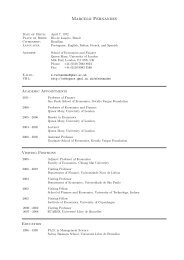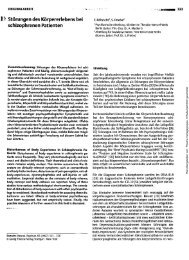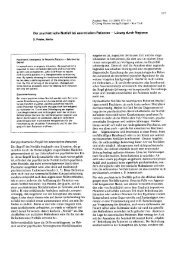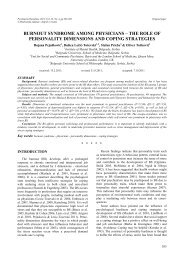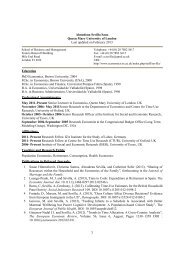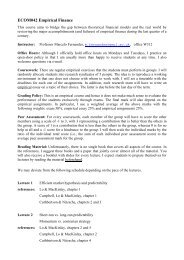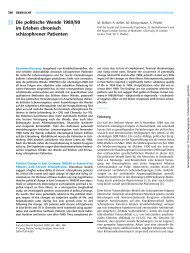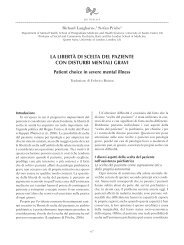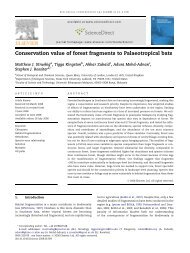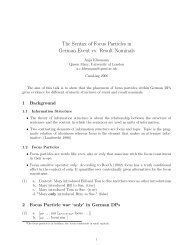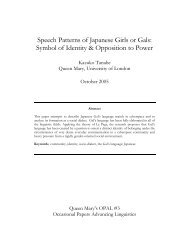Proofs - Personal Webspace for QMUL - Queen Mary, University of ...
Proofs - Personal Webspace for QMUL - Queen Mary, University of ...
Proofs - Personal Webspace for QMUL - Queen Mary, University of ...
Create successful ePaper yourself
Turn your PDF publications into a flip-book with our unique Google optimized e-Paper software.
S6 D. Dingoyan et al. / European Psychiatry 27 (2012) / supplement n°2 / S4-S9<br />
3.2. Perceived barriers<br />
The participants mentioned a number <strong>of</strong> reasons <strong>for</strong> the<br />
lower participation rates <strong>of</strong> individuals with Turkish migration<br />
backgrounds in research studies. The content analysis indicated<br />
eight distinct categories (Table 2). The fi rst category refers to<br />
the traditional role <strong>of</strong> women that is culturally determined by<br />
the Turkish community. The participants stated that women are<br />
controlled and oppressed by male family members (father, husband)<br />
and have little opportunity to make individual decisions.<br />
There<strong>for</strong>e, women would need to exhibit courage to participate<br />
in research studies. This type <strong>of</strong> self- confi dence is <strong>of</strong>ten lacking,<br />
as many Turkish women perceive themselves as subordinated<br />
and helpless without their husbands at their sides. Furthermore,<br />
the participants expressed that most Turkish women do not have<br />
the time or interest to participate in research studies because<br />
<strong>of</strong> their family responsibilities (child care, household, jobs) (e.g.,<br />
“Turkish women carry a heavy burden on their shoulders and<br />
typically do not have time to deal with such interviews.”). A<br />
lack <strong>of</strong> knowledge (category 2) and a lack <strong>of</strong> interest (category 3)<br />
were further reported reasons. Lack <strong>of</strong> knowledge was mainly<br />
attributed to low education and knowledge levels as well as a<br />
Table 1<br />
Socio- demographic characteristics <strong>of</strong> focus group participants with Turkish migration backgrounds.<br />
characteristics N labels results percentage<br />
age 37 range<br />
mean age<br />
gender 37 female<br />
male<br />
country <strong>of</strong> birth 37 Turkey<br />
Germany<br />
nationality 37 Turkey<br />
Germany<br />
jear <strong>of</strong> migration 37 1969 - 1981<br />
1982 - 1994<br />
1995 - 2008<br />
fi rst language 37 Turkish<br />
German<br />
both<br />
highest 37 any school<br />
graduation<br />
37 any school graduation<br />
primary school (5 years)<br />
secondary school (Haupt- or Volksschule)<br />
secondary school (Realschule)<br />
grammar school (Gymnasium)<br />
other<br />
<strong>Pro<strong>of</strong>s</strong><br />
Table 2<br />
Stated reasons <strong>for</strong> the low er willingness <strong>of</strong> individuals with Turkish migration backgrounds to participate in health research studies.<br />
categories key words examples number<br />
<strong>of</strong> statements<br />
1 role <strong>of</strong> woman oppression<br />
"Many women are controlled by their husbands<br />
17<br />
patriarchiat<br />
and are put under pressure, it takes a lot<br />
lack <strong>of</strong> self- confi dence<br />
<strong>of</strong> courage to participate in such a survey."<br />
2 lack <strong>of</strong> knowledge ignorance<br />
lack <strong>of</strong> education<br />
unawareness<br />
3 lack <strong>of</strong> interest disinterest<br />
passivity<br />
lack <strong>of</strong> openness<br />
4 German- Turkish interactions cultural differences<br />
lack <strong>of</strong> communication<br />
lack <strong>of</strong> empathy<br />
5 mistrust distrust<br />
scepticism<br />
trust problem<br />
6 anxiety fear<br />
concerns<br />
doubts<br />
7 data privacy protection data abuse<br />
problems through signature<br />
state control<br />
8 benefi ts <strong>of</strong> the study study aim<br />
benefi ts<br />
personal advantages<br />
16- 62<br />
44<br />
29<br />
8<br />
31<br />
6<br />
12<br />
25<br />
8<br />
7<br />
4<br />
33<br />
1<br />
3<br />
1<br />
10<br />
6<br />
6<br />
10<br />
4<br />
"Un<strong>for</strong>tunately, education does not have a great meaning<br />
<strong>for</strong> Turks and they do not take it seriously."<br />
78%<br />
22%<br />
84%<br />
16%<br />
32%<br />
68%<br />
42%<br />
37%<br />
21%<br />
89%<br />
3%<br />
8%<br />
3%<br />
27%<br />
16%<br />
16%<br />
27%<br />
11%<br />
“The Turks remain indifferent towards such projects.” 15<br />
"We stand outside social life, we lack the interaction<br />
with the Germans.”<br />
"Distrust if a letter is delivered from an unknown<br />
location. Distrust <strong>of</strong> the German population."<br />
"Fear <strong>of</strong> to get ripped <strong>of</strong>f and not get out <strong>of</strong> it anymore." 10<br />
"Does the German government want to monitor us?<br />
There is the fear that our pr<strong>of</strong>i ts will be taken<br />
out <strong>of</strong> our hands.”<br />
"Many are wondering what benefi t the participation has<br />
<strong>for</strong> them, and what will come <strong>of</strong> it at the end?"<br />
15<br />
14<br />
13<br />
9<br />
9



